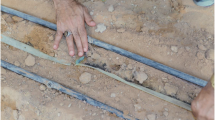Abstract
This study aimed to determine the effects of three irrigation water levels on the yield, soluble solid content and some physiological traits of pepper plants in soils mixed with biochar at four different doses. The study was conducted as a pot experiment in three replications for each treatment setup in a completely randomized design under greenhouse conditions. The experiment comprised controlled/full irrigation (I0), 25% deficit irrigation (I1), 50% deficit irrigation (I2), and four biochar treatments: non-biochar at 0% (B0), biochar at 0.75% (B1), biochar at 1.5% (B2), and biochar at 3% (B3). Biochar application significantly increased pepper growth and yield. Significant improvements in the physiological properties of the plant with the increase in biochar dose (B1, B2, and B3) in deficit irrigation applications were determined. Under the 50% water deficit conditions (I2), the biochar amendments (B3I2, B2I2, and B1I2) increased the irrigation water productivity compared to the control (non-biochar, B0I2), as well as water savings of 18.4, 12.8 and 8.3%, respectively. Biochar amendments increased the moisture retention in the soil and saved irrigation water. In this study, the highest efficiency was obtained from the B3 (3% w:w) treatment. In addition, biochar increased irrigation water productivity by improving soil properties under water deficit conditions.
Zusammenfassung
Ziel dieser Studie war es, die Auswirkungen von drei Bewässerungswassermengen auf den Ertrag, den Gehalt an löslichen Feststoffen und einige physiologische Eigenschaften von Paprikapflanzen in Böden zu bestimmen, die mit Biokohle in vier verschiedenen Dosierungen gemischt wurden. Die Studie wurde als Topfversuch mit drei Wiederholungen für jede Behandlung in einem vollständig randomisierten Design unter Gewächshausbedingungen durchgeführt. Der Versuch umfasste eine kontrollierte/vollständige Bewässerung (I0), eine 25 %ige Defizitbewässerung (I1), eine 50 %ige Defizitbewässerung (I2) und vier Biokohle-Behandlungen: keine Biokohle bei 0 % (B0), Biokohle bei 0,75 % (B1), Biokohle bei 1,5 % (B2) und Biokohle bei 3 % (B3). Der Einsatz von Biokohle steigerte das Wachstum und den Ertrag von Paprika signifikant. Es wurden signifikante Verbesserungen der physiologischen Eigenschaften der Pflanze mit der Erhöhung der Biokohle-Dosis (B1, B2 und B3) bei der Anwendung von Defizitbewässerung festgestellt. Unter den Bedingungen eines 50-prozentigen Wasserdefizits (I2) steigerten die Biokohlezusätze (B3I2, B2I2 und B1I2) die Produktivität des Bewässerungswassers im Vergleich zur Kontrolle (ohne Biokohle, B0I2) und führten zu einer Wassereinsparung von 18,4 %, 12,8 % bzw. 8,3 %. Biokohlezusätze erhöhten die Feuchtigkeitsspeicherung im Boden und sparten Bewässerungswasser. In dieser Studie wurde die höchste Effizienz mit der Behandlung B3 (3 % w:w) erzielt. Darüber hinaus erhöhte Biokohle die Produktivität der Bewässerung durch Verbesserung der Bodeneigenschaften unter Wasserdefizitbedingungen.








Similar content being viewed by others
References
Agbna GH, Dongli S, Zhipeng L, Elshaikh NA, Guangcheng S, Timm LC (2017) Effects of deficit irrigation and biochar addition on the growth, yield, and quality of tomato. Sci Hortic 222:90–101. https://doi.org/10.1016/j.scienta.2017.05.004
Ajayi AE, Horn R (2016) Modification of chemical and hydro-physical properties of two texturally differentiated soils due to varying magnitudes of added biochar. Soil Tillage Res 164:34–44. https://doi.org/10.1016/j.still.2016.01.011
Akhtar SS, Li G, Andersen MN, Liu F (2014) Biochar enhances yield and quality of tomato under reduced irrigation. Agric Water Manag 138:37–44. https://doi.org/10.1016/j.agwat.2014.02.016
Beckles DM (2012) Factors affecting the postharvest soluble solids and sugar content of tomato (Solanum lycopersicum L.) fruit. Postharvest Biol Technol 63(1):129–140. https://doi.org/10.1016/j.postharvbio.2011.05.016
Benešová M, Hola D, Fischer L, Jedelský PL, Hnilička F, Wilhelmová N, Hniličková H (2012) The physiology and proteomics of drought tolerance in maize: early stomatal closure as a cause of lower tolerance to short-term dehydration? PLoS ONE 7(6):e38017. https://doi.org/10.1371/journal.pone.0038017
Black CA (1965) Method of soil analysis: chemical and microbiological properties. American Society of Agronomy, Madison. ISBN 0‑89118-204‑7.
Bondada BR, Syvertsen JP (2003) Leaf chlorophyll, net gas exchange and chloroplast ultrastructure in citrus leaves of different nitrogen status. Tree Physiol 23(8):553–559. https://doi.org/10.1093/treephys/23.8.553
Bouyoucos GJ (1951) A recalibration of the hidrometer for making mechanical analysis of soils. Agron J 43:434–438. https://doi.org/10.2134/agronj1951.00021962004300090005x
Bremner JM (1965) Organic forms of nitrogen. In: Methods of soil analysis. SSSA, pp 1238–1255 https://doi.org/10.2134/agronmonogr9.2.c34
Chan KY, Van Zwieten L, Meszaros I, Downie A, Joseph S (2007) Agronomic values of greenwaste biochar as a soil amendment. Aust J Soil Res 45:629–634. https://doi.org/10.1071/SR07109
Chapman HD (1965) Cation exchange capacity. In: Black CA (ed) Methods of soil analysis part 2 chemical and microbiological properties. Agronomy No. 9. ASA-SSSA, Madison, pp 891–901 https://doi.org/10.2134/agronmonogr9.2.c6
Cornelissen G, Martinsen V, Shitumbanuma V, Alling V, Breedveld GD, Rutherford DW, Mulder J (2013) Biochar effect on maize yield and soil characteristics in five conservation farming sites in Zambia. Agronomy 3(2):256–274. https://doi.org/10.3390/agronomy3020256
De Pascale S, Costa DL, Vallone S, Barbieri G, Maggio A (2011) Increasing water use efficiency in vegetable crop production: from plant to irrigation systems efficiency. HortTechnology 21(3):301–308. https://doi.org/10.21273/HORTTECH.21.3.301
Dempster DN, Jones DL, Murphy DV (2012) Clay and biochar amendments decreased inorganic but not dissolved organic nitrogen leaching in soil. Soil Res 50(3):216–221. https://doi.org/10.1071/SR11316
Dong L, Wang J, Shen M, Zhang H, Wang L, Li C, Lu C (2022) Biochar combined with nitrogen fertilizer affects soil properties and wheat yield in medium-low-yield farmland. Soil Use Manag 38(1):584–595. https://doi.org/10.1111/sum.12712
Duncan DB (1955) Multiple range and multiple F test. Biometrics 11(1):1–42. https://doi.org/10.2307/3001478
FAO (2017) Leveraging food systems for inclusive rural transformation. https://www.fao.org/3/i7658e/i7658e.pdf. Accessed 21.01.2022
Gaskin JW, Steiner C, Harris K, Das KC, Bibens B (2008) Effect of low-temperature pyrolysis conditions on biochar for agricultural use. Trans ASABE 51:2061–2069. https://doi.org/10.13031/2013.25409
Gong XW, Liu H, Sun JS, Gao Y, Zhang H (2019) Comparison of Shuttleworth Wallace model and dual crop coefficient method for estimating evapotranspiration of tomato cultivated in a solar greenhouse. Agric Water Manag 217:141–153. https://doi.org/10.1016/j.agwat.2019.02.012
Günal E, Erdem H, Çelik İ (2018) Effects of three different biochar’s amendment on water retention of silty loam and loamy soils. Agric Water Manag 208:232–244. https://doi.org/10.1016/j.agwat.2018.06.004
Guo L, Bornø ML, Niu W, Liu F (2021) Biochar amendment improves shoot biomass of tomato seedlings and sustains water relations and leaf gas exchange rates under different irrigation and nitrogen regimes. Agric Water Manag 245:106580. https://doi.org/10.1016/j.agwat.2020.106580
Jackson M (1958) Soil chemical analysis. Prentice Hall, Englewood Cliffs https://doi.org/10.2136/sssaj1958.03615995002200030025x (498p)
Jeffery S, Verheijen FG, van der Veld M, Bastos AC (2011) A quantitative review of the effects of biochar application to soils on crop productivity using meta-analysis. Agric Ecosyst Environ 144(1):175–187. https://doi.org/10.1016/j.agee.2011.08.015
Johnstone PR, Hartz TK, LeStrange M, Nunez JJ, Miyao EM (2005) Managing fruit soluble solids with late-season deficit irrigation in drip-irrigated processing tomato production. HortScience 40(6):1857–1861. https://doi.org/10.21273/HORTSCI.40.6.1857
Kammann C, Graber ER (2015) Biochar effects on plant ecophysiology. In: Lehmann J, Joseph S (eds) Biochar for environmental management: science, technology and implementation, pp 391–420. ISBN 978-0-415-70415‑1
Kammann C, Linsel S, Gößling JW, Koyro HW (2011) Influence of biochar on drought tolerance of Chenopodium quinoa Willd and on soil–plant relations. Plant Soil 345(1):195–210. https://doi.org/10.1007/s11104-011-0771-5
Kumar H, Ganesan SP, Sang H, Sahoo L, Garg A, Sekharan S, Leung AK (2022) Exploring relations between plant photochemical quantum parameters and unsaturated soil water retention for biochars and pith amended soils. Sci Total Environ 804:150251. https://doi.org/10.1016/j.scitotenv.2021.150251
Laghari M, Mirjat MS, Hu Z, Fazal S, Xiao B, Hu M, Chen Z, Guo D (2015) Effects of biochar application rate on sandy desert soil properties and sorghum growth. Catena 135:313–320. https://doi.org/10.1016/j.catena.2015.08.013
Laird DA, Fleming P, Davis DD, Horton R, Wang BQ, Karlen DL (2010) Impact of biochar amendments on the quality of a typical midwestern agricultural soil. Geoderma 158:443–449. https://doi.org/10.1016/j.geoderma.2010.05.013
Lehmann J, Joseph S (2009) Biochar for environmental management: science and technology. Earthscan, London.
Lehmann J, Rondon M (2006) Biochar soil management on highly weathered soils in the humid tropics. Biol Approaches To Sustain Soil Syst 113:517–530
Lim TJ, Spokas KA, Feyereisen G, Novak JM (2016) Predicting the impact of biochar additions on soil hydraulic properties. Chemosphere 142:136–144. https://doi.org/10.1016/j.chemosphere.2015.06.069
Liu C, Wang H, Tang X, Guan Z, Reid BJ, Rajapaksha AU, Ok YS, Sun H (2016) Biochar increased water holding capacity but accelerated organic carbon leaching from a sloping farmland soil in China. Environ Sci Pollut Res 23(2):995–1006. https://doi.org/10.1007/s11356-015-4885-9
Liu X, Wang H, Liu C, Sun B, Zheng J, Bian R, Drosos M, Zhang X, Li L, Pan G (2021) Biochar increases maize yield by promoting root growth in the rainfed region. Arch Agron Soil Sci 67(10):1411–1424. https://doi.org/10.1080/03650340.2020.1796981
Liu XH, Han X, Zhang C (2012) Effect of biochar on soil aggregates in the Loess Plateau: results from incubation experiments. IJAB 14(6):975–979
Major J, Rondon M, Molina D, Riha SJ, Lehmann J (2010) Maize yield and nutrition during 4 years after biochar application to a Colombian savanna oxisol. Plant Soil 333(1):117–128. https://doi.org/10.1007/s11104-010-0327-0
Radoglou KM, Jarvis PG (1990) Effects of CO2 enrichment on four poplar clones. II. Leaf surface properties. Ann Bot 65:627–632. https://doi.org/10.1093/oxfordjournals.aob.a087979
Richards LA (1954) Diagnosis and improvement of saline alkali soils. Agriculture, 160, Handbook 60. US Department of Agriculture, Washington DC.
Rogovska N, Laird DA, Rathke SJ, Karlen DL (2014) Biochar impact on midwestern mollisols and maize nutrient availability. Geoderma 230:340–347. https://doi.org/10.1016/j.geoderma.2014.04.009
Saito T, Fukuda N, Nishimura S (2006) Effects of salinity treatment duration and planting density on size and sugar content of hydroponically grown tomato fruits. J Jpn Soc Hortic Sci 75(5):392–398. https://doi.org/10.2503/jjshs.75.392
Schepers JS, Blackmer TM, Wilhelm WW, Resende M (1996) Transmittance and reflectance measurements of cornleaves from plants with different nitrogen and water supply. J Plant Physiol 148(5):523–529. https://doi.org/10.1016/S0176-1617(96)80071-X
Seehausen ML, Gale NV, Dranga S, Hudson V, Liu N, Michener J, Thurston E, Williams C, Smith SM, Thomas SC (2017) Is there a positive synergistic effect of biochar and compost soil amendments on plant growth and physiological performance? Agronomy 7(13):1–15. https://doi.org/10.3390/agronomy7010013
Smart RE, Bingham GE (1974) Rapid estimates of relative water content. Plant Physiol 53:258–260. https://doi.org/10.1104/pp.53.2.258
Streubel JD, Collins HP, Garcia-Perez M, Tarara J, Granatstein D, Kruger CE (2011) Influence of contrasting biochar types on five soils at increasing rates of application. Soil Sci Soc Am J 75(4):1402–1413. https://doi.org/10.2136/sssaj2010.0325
Sun H, Jeyakumar P, Xiao H, Li X, Liu J, Yu M, Rana PBJ, Shi W (2022) Biochar can increase Chinese cabbage (brassica oleracea L.) yield, decrease nitrogen and phosphorus leaching losses in intensive vegetable soil. Phyton 91(1):197–206. https://doi.org/10.32604/phyton.2022.016492
Sun Y, Yan F, Cui X, Liu F (2014) Plasticity in stomatal size and density of potato leaves under different irrigation and phosphorus regimes. J Plant Physiol 171(14):1248–1255. https://doi.org/10.1016/j.jplph.2014.06.002
Tahir S, Gul S, Ghori SA, Sohail M, Batool S, Jamil N, Shahwani MN (2018) Biochar influences growth performance and heavy metal accumulation in spinach under wastewater irrigation. Cogent Food Agric 4(1):1467253. https://doi.org/10.1080/23311932.2018.1467253
Wang Y, Zhou M, Hou M, Chen Y, Sui Y, Jiao X (2022) Regulation of nitrogen balance and yield on greenhouse eggplant under biochar addition in Mollisol. Plant Soil Environ 68(1):36–48. https://doi.org/10.17221/393/2021-PSE
Yan F, Sun Y, Song F, Liu F (2012) Differential responses of stomatal morphology to partial root-zone drying and deficit irrigation in potato leaves under varied nitrogen rates. Sci Hortic 145:76–83. https://doi.org/10.1016/j.scienta.2012.07.026
Yildirim E, Ekinci M, Turan M (2021) Impact of biochar in mitigating the negative effect of drought stress on cabbage seedlings. J Soil Sci Plant Nutr 21(3):2297–2309. https://doi.org/10.1007/s42729-021-00522-z
Zhang C, Li X, Yan H, Ullah I, Zuo Z, Li L, Yu J (2020) Effects of irrigation quantity and biochar on soil physical properties, growth characteristics, yield and quality of greenhouse tomato. Agric Water Manag 241:106263. https://doi.org/10.1016/j.agwat.2020.106263
Zhang H, Voroney RP, Price GW (2015) Effects of temperature and processing conditions on biochar chemical properties and their influence on soil C and N transformations. Soil Biol Biochem 83:19–28. https://doi.org/10.1016/j.soilbio.2015.01.006
Zoghi Z, Hosseini SM, Kouchaksaraei MT, Kooch Y, Guidi L (2019) The effect of biochar amendment on the growth, morphology and physiology of Quercus castaneifolia seedlings under water-deficit stress. Eur J Forest Res 138(6):967–979. https://doi.org/10.1007/s10342-019-01217-y
Funding
This study was not funded.
Author information
Authors and Affiliations
Contributions
All authors contributed to the study conception and design. All authors read and approved the final manuscript.
Corresponding author
Ethics declarations
Conflict of interest
T. Cakmakcı and U. Sahın declare that they have no competing interests.
Rights and permissions
About this article
Cite this article
Cakmakcı, T., Sahın, U. Yield, Physiological Responses and Irrigation Water Productivity of Capia Pepper (Capsicum annuum L.) at Deficit Irrigation and Different Biochar Levels. Gesunde Pflanzen 75, 317–327 (2023). https://doi.org/10.1007/s10343-022-00703-5
Received:
Accepted:
Published:
Issue Date:
DOI: https://doi.org/10.1007/s10343-022-00703-5




